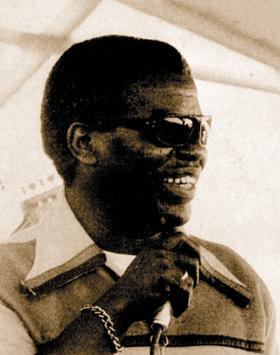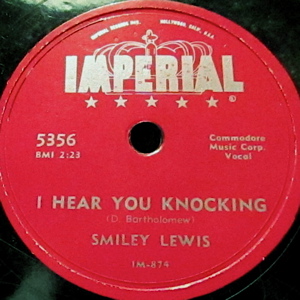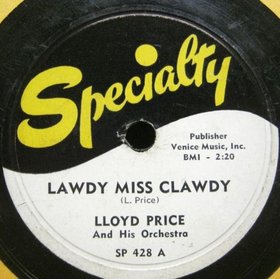Related Research Articles

Antoine Dominique Domino Jr., known as Fats Domino, was an American pianist, singer and songwriter. One of the pioneers of rock and roll music, Domino sold more than 65 million records. Born in New Orleans to a French Creole family, Domino signed to Imperial Records in 1949. His first single "The Fat Man" is cited by some historians as the first rock and roll single and the first to sell more than 1 million copies. Domino continued to work with the song's co-writer Dave Bartholomew, contributing his distinctive rolling piano style to Lloyd Price's "Lawdy Miss Clawdy" (1952) and scoring a string of mainstream hits beginning with "Ain't That a Shame" (1955). Between 1955 and 1960, he had eleven Top 10 US pop hits. By 1955, five of his records had sold more than a million copies, being certified gold.

New Orleans rhythm and blues is a style of rhythm and blues that originated in New Orleans. It was a direct precursor to rock and roll and strongly influenced ska. Instrumentation typically includes drums, bass, piano, horns, electric guitar, and vocals. The style is characterized by syncopated "second line" rhythms, a strong backbeat, and soulful vocals. Artists such as Roy Brown, Dave Bartholomew, and Fats Domino are representative of the New Orleans R&B sound.

David Louis Bartholomew was an American musician, bandleader, composer, arranger, and record producer. He was prominent in the music of New Orleans throughout the second half of the 20th century. Originally a trumpeter, he was active in many musical genres, including rhythm and blues, big band, swing music, rock and roll, New Orleans jazz, and Dixieland. In his induction into the Rock and Roll Hall of Fame, he was cited as a key figure in the transition from jump blues and swing to R&B and as "one of the Crescent City's greatest musicians and a true pioneer in the rock and roll revolution".

Christophe Kenner was an American, New Orleans-based R&B singer and songwriter, best known for two hit singles in the early 1960s, "I Like It Like That" and "Land of 1000 Dances", which became staples in the repertoires of many other musicians.
"Blue Monday" is a song originally, written by Dave Bartholomew, first recorded in 1953 by Smiley Lewis and issued as a single, in January 1954, on Imperial Records. The single, with a slow-rocking beat, features an instrumental electric guitar solo by Lewis.

"Ain't That a Shame" is a song written by Fats Domino and Dave Bartholomew. Domino's recording of the song, originally stated as "Ain't It a Shame", released by Imperial Records in 1955, was a hit, eventually selling a million copies. It reached number 1 on the Billboard R&B chart and number 10 on the pop chart. The song is ranked number 438 on Rolling Stone magazine's 500 Greatest Songs of All Time list.

Overton Amos Lemons, known as Smiley Lewis, was an American New Orleans rhythm and blues singer and guitarist. The music journalist Tony Russell wrote that "Lewis was the unluckiest man in New Orleans. He hit on a formula for slow-rocking, small-band numbers like 'The Bells Are Ringing' and 'I Hear You Knocking' only to have Fats Domino come up behind him with similar music with a more ingratiating delivery. Lewis was practically drowned in Domino's backwash."

"I Hear You Knocking" is a rhythm and blues song written by Dave Bartholomew. New Orleans rhythm and blues singer Smiley Lewis first recorded the song in 1955. The lyrics tell of the return of a former lover who is rebuffed.
"Walking to New Orleans" is a 1960 song by Bobby Charles, written for and recorded by Fats Domino. The record was a hit, released on Imperial Records, reaching #6 on the pop chart and #2 on the R&B chart.

"Lawdy Miss Clawdy" is a song by New Orleans singer/songwriter Lloyd Price that "grandly introduced The New Orleans Sound". It was first recorded by Price in 1952 with Fats Domino and Dave Bartholomew during his first session for Art Rupe and Specialty Records. The song became one of the biggest selling R&B records of 1952 and crossed over to other audiences. "Lawdy Miss Clawdy" inspired many songs and has been recorded by a variety of artists.

"One Night" is a song written by Dave Bartholomew, Pearl King, and Anita Steinman. It was an R&B hit for Smiley Lewis in 1956, before being recorded with greater commercial success by Elvis Presley in 1957.

"I Know (You Don't Love Me No More)" is an R&B song written and recorded by American singer Barbara George, released as her debut single in 1961. It became her signature song and her only major hit in United States, reaching number-one on the Billboard R&B singles chart and #3 in the Hot 100. The song was later covered by various artists, inducing Fats Domino, Cher, Ike & Tina Turner, and Bonnie Raitt. A Spanish version by Marisela topped Billboard's Latin chart in 1988. The Shirelles borrowed the melody of "I Know" for their 1963 cover of "Everybody Loves A Lover".
"I Want to Walk You Home" is a July 1959 pop-style R&B song written and recorded by Fats Domino. Released by Imperial Records as a single, it was the last of Domino's releases to reach number one on the R&B chart. "I Want to Walk You Home" stayed at the top spot for a single week and also peaked at number eight on the Billboard Hot 100.

"I'm Walkin'" is a 1957 song by Fats Domino, written with frequent collaborator Dave Bartholomew. The single was Domino's third release in a row to reach No. 1 on the R&B Best Sellers chart, where it stayed for six weeks. It also broadened the singer's crossover appeal, peaking at No. 4 on the pop singles chart. The prominent saxophone solo was played by Herbert Hardesty. Lee Allen was also on sax, Frank Fields on bass, Earl Palmer on drums, and Walter "Papoose" Nelson on guitar.
"Ain't That Just Like a Woman (They'll Do It Every Time)" is a 1946 song by Louis Jordan and His Tympany Five. The song reached number one on the R&B Jukebox chart for two weeks and peaked at number seventeen on the pop chart. Chuck Berry, who acknowledged the influence of both Louis Jordan and Carl Hogan, copied the latter's guitar intro to the song for his 1958 classic "Johnny B. Goode".
"I'm Gonna Be a Wheel Someday" is a popular song written by Roy Hayes, Fats Domino and Dave Bartholomew. The song was first recorded by Bobby Mitchell & The Toppers in 1957 and released in the same year.
"Whole Lotta Lovin'" is a 1958 song by Fats Domino, written by Domino and Dave Bartholomew.
"Bo Weevil" is a song written by Dave Bartholomew and Fats Domino, recorded by Domino on October 15, 1955. Imperial Records released it as a single in January 1956, which peaked at number 35 on the Billboard Hot 100 chart and number 5 on its R&B chart in February 1956. The song is included on his 1956 album, Rock and Rollin' with Fats Domino.
"Goin' Home" is a song written by Fats Domino and Imperial Records producer Alvin Young. It was recorded by Domino in January 1952 and issued as a single by Imperial in March of that year. After debuting on April 26, 1952, the single reached No. 1 on the U.S. Billboard Best Selling Rhythm & Blues Records chart and became his first to top the record charts.
References
- 1 2 3 4 Hannusch, Jeff; Block, Adam (1991). Antoine "Fats" Domino: "They Call Me the Fat Man..." (Box set booklet). Fats Domino. Hollywood, California: Imperial Records/EMI USA. pp. 26, 48, 77. E2-96784.
- 1 2 Whitburn, Joel (1988). "Fats Domino". Top R&B Singles 1942–1988. Menomonee Falls, Wisconsin: Record Research. p. 123. ISBN 0-89820-068-7.